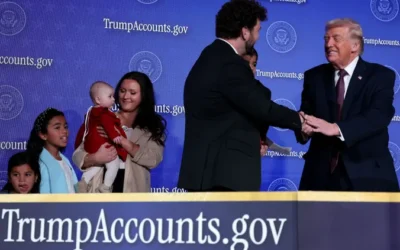After the Trump Administration’s 10% tariff on Chinese imports went into effect, China announced retaliatory tariffs on certain U.S. imports — including a 15% levy on U.S. coal and liquid natural gas and 10% on crude oil, agricultural machinery, large-displacement automobiles and pickup trucks. The Chinese retaliatory tariffs are set to be put in place in Feb. 10.
President Donald Trump’s use of tariffs as a negotiation tool has shown early signs of success. The U.S. tariff on China was the only one to take effect, after the U.S. agreed to delay the proposed 25% tariffs announced on goods from Mexico and Canada.
Mexico’s president, Claudia Sheinbaum, announced on X that as part of the agreement, the U.S. would increase efforts to prevent “high-powered weapon” trafficking over the border. Canada has agreed to name a “fentanyl czar” and has vowed to launch a Canada-U.S. Joint Strike Force aimed to “combat organized crime, fentanyl and money laundering.”
U.S. leaders have been highly critical of Canada’s business practices, including its open banking pushback and government overspending despite its trade deficit between the two nations, which is at its highest in 20 years in favor of the Canadians. The separate agreements between the U.S. and the two countries is set to last one month.
Canada’s environmental initiatives, including many led by the resigning Canadian Prime Minister Justin Trudeau, have made the country heavily dependent on the United States for the majority of its population to maintain standard energy consumption. Oil from Western Canada must be pumped through the U.S. to reach the country’s eastern population centers due to the Canadian Parliament shutting down pipeline efforts in 2017 in the name of regulatory uncertainty and environmentalism. Those efforts have continued in recent years, and now experts say such a pipeline would take 10 to 15 years to build once construction begins.
CFOs from industries like technology, food service and automotive manufacturing have all weighed in on tariff impacts on their business. Adam Rymer of Chipotle has said he and his team are “keeping an eye on it,” Rimini Street CFO Michael Perica said impacted CFOs should immediately start a task force of their own and Tesla’s CFO said it will have a significant impact on the company’s profitability.
Other CFOs in industries that could have been impacted have proactively prepared or have already moved their supply chain out of those markets. Clothing manufacturer Levi Strauss had their CFO surprisingly say tariffs aren’t an issue on their latest earnings call last week, saying the company has a very small percentage of product coming from China and Mexico.
These mentioned countries aren’t the only nations under the crosshairs of the administration. Secretary of State Marco Rubio, a former senator who is acting on behalf of the new administration in negotiations in South America, recently warned Panama of possible “U.S. action” at the Panama Canal should the country continue to allow Chinese influence in the American-built passageway. Trump has also mentioned that the nations of the European Union are next on the docket.





